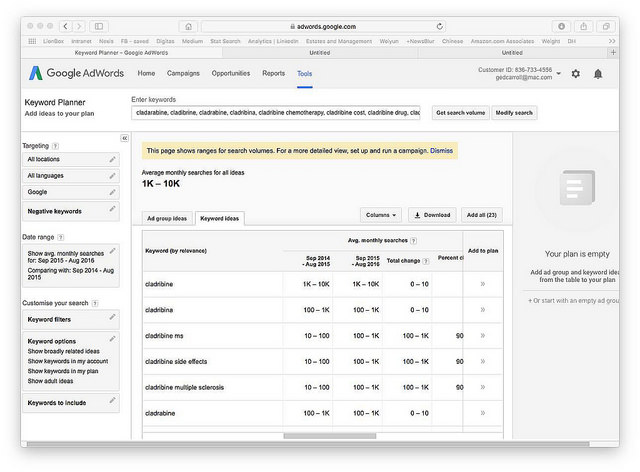 Marketers, PR and SEO professionals turn to Google’s Keyword Planner to refine their keywords when producing blog posts and other website content. To their dismay, Google has severely curtailed functionality of inactive AdWords accounts or accounts with low monthly spending. Targeting the right keywords is essential for winning top organic search engine results.
Marketers, PR and SEO professionals turn to Google’s Keyword Planner to refine their keywords when producing blog posts and other website content. To their dismay, Google has severely curtailed functionality of inactive AdWords accounts or accounts with low monthly spending. Targeting the right keywords is essential for winning top organic search engine results.
Marketers who don’t spend enough on AdWords now see broad ranges for average monthly search volume on their keyword inquires. Those broad ranges, such as 1K to 10K, offer little insight and may be practically useless, they say.
What’s the Threshold?
How much you must spend on AdWords to retain detailed keyword data remains unclear. Google is characteristically mum. One AdWords user, Lance C., relayed on a community forum that a Google customer service manager told him that “there must be continuous activity in your google AdWords campaign (clicks and campaigns running) for a minimum of 3-4 months continuous in order to gain focused keyword results.”
Google claims the change will prevent bots from overwhelming the keyword planner with queries, which had slowed the tool and occasionally caused errors that prevented people from using it.

Image source: Ged Carroll via Flickr
Content marketers and others commenting online don’t buy that reasoning. Naturally displeased, they blasted the decreased functionality as a money-grabbing move that hurts small businesses. Some note that they spend small amounts on AdWords themselves but advise clients with monthly budgets exceeding $10,000. Google may have opened a door for Bing, Microsoft’s search engine, some warn.
Although agencies likely spend enough and probably won’t be affected, marketing departments with small PPC budgets and freelance SEO consultants and content writers could be severely impacted.
Possible Solutions
Google recommends low spenders use the forecast feature to see detailed monthly projections for clicks, impressions and cost. This data can be viewed at ad group levels. In the keywords tab, it can reveal projected CTR rate, average CPC and average position, explains SEO and social media marketing expert Sean Clark in Social Media Today.
“However, the problem is that the forecasting data is geared heavily towards AdWords campaigns, and as such it’s not likely to be of any use to those wishing to gain insight into organic search data, such as SEOs and content marketers,” Clark says.
SiteVisibility, a UK-based digital marketing agency, suggests these alternatives:
Find another tool. Other tools – such as Moz Keyword Explorer, SEMRush, SearchMetrics, Advanced Web Ranking and KeywordTool.IO – do a similar job, perhaps even better. Unfortunately, few are free. Many use Google data and it’s unclear if or how they will be affected.
Analyze social media. Social media monitoring and measurement tools can provide analytics and insights that can guide digital marketing strategies. Conversations on social media can mirror consumers’ web search intentions.
Share keyword planners. At least one digital marketer asked others to share their keyword planner with him and even offered to pay, (although the tactic sounds like a violation of Google’s guideline).
Is anyone willing to share their Keyword Planner – I’ll pay.
Google throttling planner for low spending accounts https://t.co/fmyAbxyJES— James Dunn (@GiJamesD) August 16, 2016
Use intuition. Try to think like your customers rather than relying completely on numbers. Google itself as said it is de-emphasizing keywords and analyzing user intention.
Bottom Line: Google’s recent decision to limit data its keyword planner tool provides to dormant and low-spending AdWords accounts creates difficulties for PR, SEO and content marketing. Fortunately, other keyword research tools and social media monitoring and measurement offer alternatives that might provide deeper insights.
William J. Comcowich founded and served as CEO of CyberAlert LLC, the predecessor of Glean.info. He is currently serving as Interim CEO and member of the Board of Directors. Glean.info provides customized media monitoring, media measurement and analytics solutions across all types of traditional and social media.





Trackbacks/Pingbacks